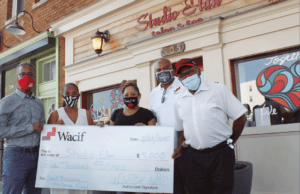Building economic opportunity in underserved neighborhoods
Wacif’s mission is to promote equity and economic opportunity in underserved neighborhoods in the Washington, D.C. region. Since its founding (also in 1987), Wacif has provided:
- $50 million in flexible financing for over 2,000 local small businesses and affordable housing developments. Since April 2020, Wacif has helped 1,100 area businesses adapt to the impacts of COVID, navigate the Payroll Protection Program (PPP) to obtain forgivable loans, and refinance existing debt.
- Wacif is on a growth trajectory, with more than 50% of its 35-year capital deployment happening in 2020-2021 alone, corresponding with more than 20,000 local jobs created and retained over that time period.
- 79% of loans supporting woman-owned or minority-owned businesses. 96% of Wacif’s loans in the last two years were to entrepreneurs of color; 50% to women, 40% to communities east of the Anacostia River in Washington, D.C., 11% in Prince George’s County, MD, and 6% in Baltimore, MD.
- 2,500 hours of business counseling and technical assistance for entrepreneurs. Through individual advising services and the annual class of its 2018 Ascend accelerator cohort, Wacif advised 262 entrepreneurs, graduating nine women founders of color who saw an average revenue increase of $250,000 following completion of the program, improving their business strategy, capital-raising, and operational management skills.
Borrower Story: In collaboration with Capital Impact Partners, Wacif helped administer the DMV Good Food Fund to increase the availability of fresh produce in food deserts, and the Greater Washington D.C. Entrepreneurs of Color Fund—a $6.65 million source to provide new pathways for entrepreneurship in underserved communities of color, by pairing low-cost capital with business advisory services, including networking support and coaching. One of the entrepreneurs that received support from Wacif is Mary Blackford (pictured left). To address two key challenges facing D.C.’s Ward 7—lack of fresh affordable groceries and a dearth of local brick and mortar retailers—Blackford’s vision for Market 7 serves as a critical community-based solution, bringing together sixty Black micro-businesses under one roof, which provides for economic stability while serving the holistic health and social needs for residents east of the river.

